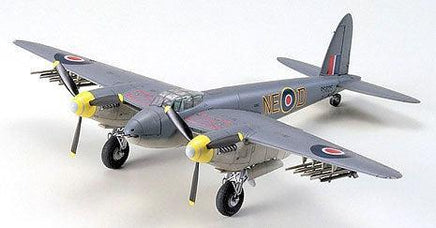Skip to product information


The De Havilland "Mosquito" made of wood, was designed based on "high-speed bombers shaking off fighter". The design of the mosquito was put into shape in 1939. The De Havilland had experience producing "DH88 Comet" made of wood before; therefore, they paid attention to ensuring that the surface of the wooden wing could be finished smoothly and the amount of aluminum could be saved. Two Rolls-Royce Merlin engines were selected as the source of power and wood was used as the material for this fuselage. The parts with metal were only the parts of the periphery of the engine and the landing gear. At first, the Air Ministry was passive in adopting the Mosquito because it was wooden and had no machine guns. However, the mosquito made a maiden flight with a maximum speed of 630km when the "Spitfire" had a maximum speed of 580km at that time. Therefore, a lot of "Mosquito" were suddenly requested. After many types of mosquitoes were produced, Night-Fighter Mk. II was armed with 7.7mm machine guns on its nose and A.I.Mk.IV radar made an appearance. This mosquito brought its ability into full play in attacking an airfield and intercepting raiding bombers. Also fighting Bomber Mk. VI, armed with four 225kg bombs and eight rocket bombs, was arranged for the actual fighting in March 1943. This type played havoc with the land forces, the battleships and the U-boat. Furthermore, it was active in attacking the railroad and its bridge at the Burmese front line, giving a blow to the Japanese army. The mosquito's wooden structure was strong against being shot; therefore, it held an established position with the pilots on the special mission.
